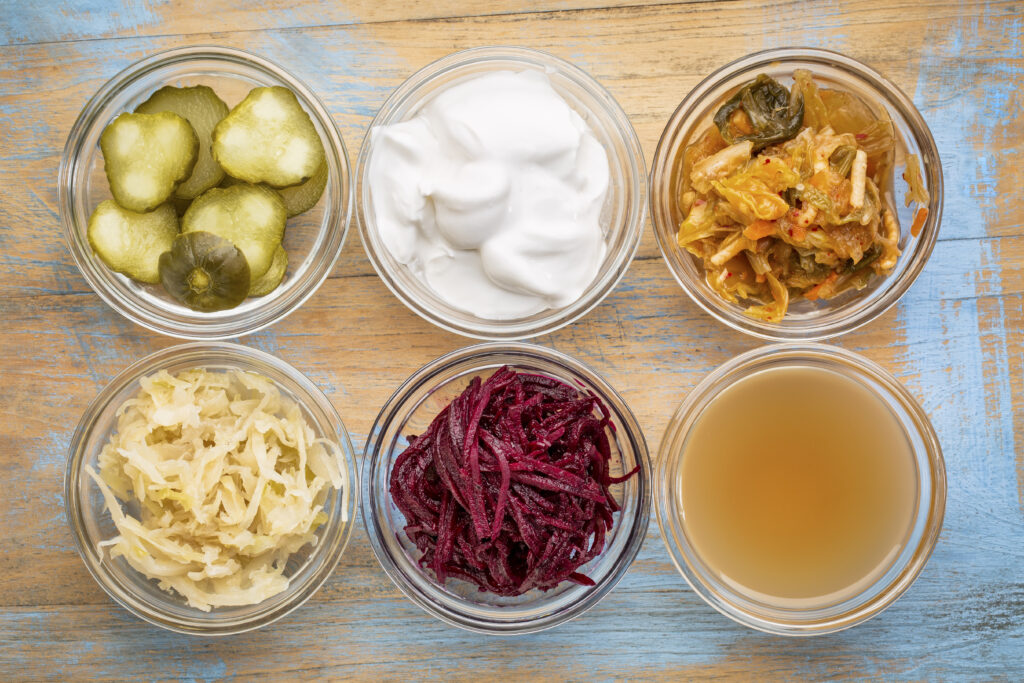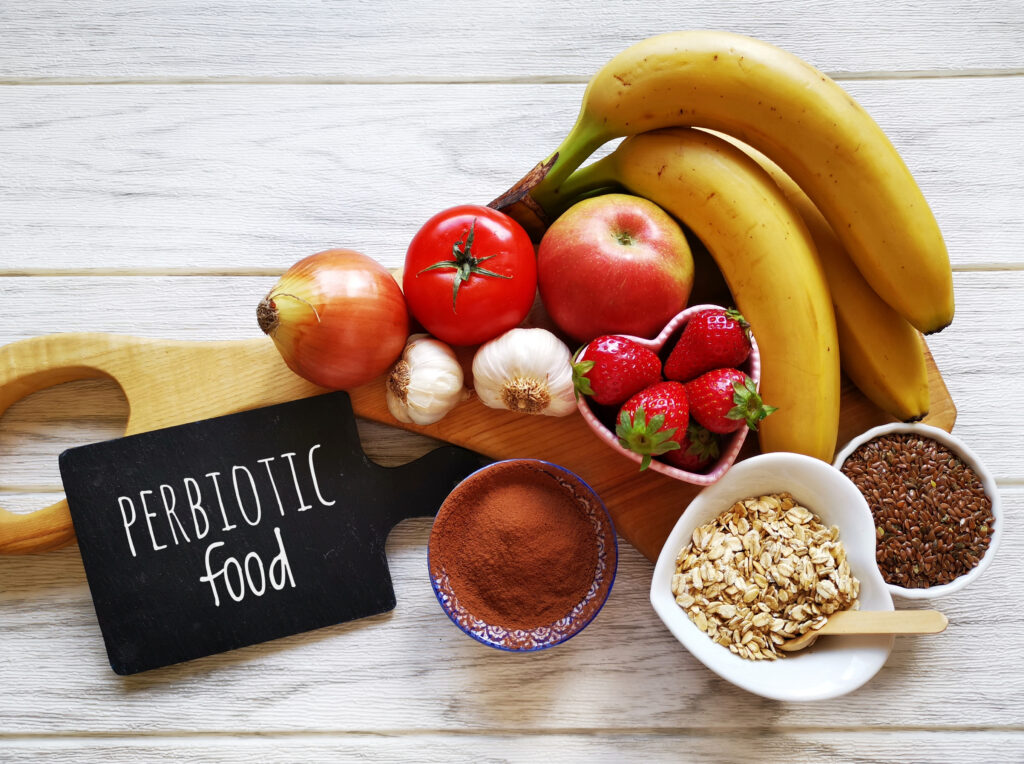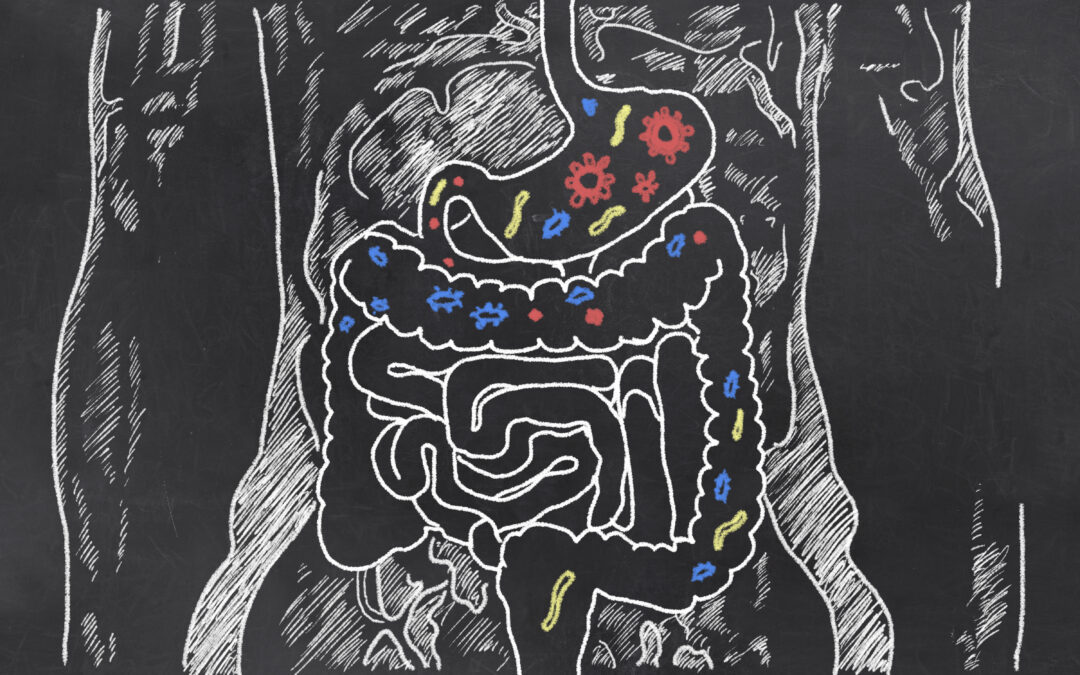What is the gut-brain connection?
Let’s unpack some of the exciting new research about the link between gut health, mood, and stress. We’ll be talking about your friendly resident gut microbes, probiotic foods, and supplements. There are some simple recipes to keep your gut and taste buds happy included too.
There are trillions of microbes that happily live in our gut. These friendly microbes do more than help us digest foods, make vitamins, and protect us from the not-so-friendly microbes. Plus, they have mood-boosting and stress-busting functions too!
It’s a hotbed of research right now and we’re finding out more about their awesome health and mood/stress benefits every day. And, while the research is just starting to figure out the many gut microbe-brain connections, it’s such a cool new topic that we couldn’t wait to share it with you!
Gut Microbes and Probiotics
The microbes that live in our digestive tract are called “gut microbiota”. The microbes that we eat are known as “probiotics”. Both of these are important to fostering a healthy gut and taking full advantage of the gut-brain connection.
“Probiotics” are live organisms that you can eat, drink, or take as a supplement. They turn milk into yogurt, and cabbage into sauerkraut; and they are great for both your gut health and mental health. Special probiotics that have mental health benefits are called “psychobiotics,” (psycho = mental health, and biotics = live).
Finding Probiotic-Rich Foods and Supplements
Probiotics are mostly found in fermented foods. They can be found in yogurt, sauerkraut, miso, tempeh, and kimchi. You can drink them in kefir or kombucha. Of course, there are a number of probiotic supplements available too. Generally, we look for one that’s refrigerated and has at least 10 billion active cultures. Finding the right supplement can be overwhelming, so reach out to your doctor or a registered dietitian to help figure out what’s best for you.

Simple, Probiotic-Rich Recipes
Try some of our team favorites!
Confetti Vegetable Salad with Miso Dressing
Cauliflower Olive Salad with Yogurt
Strawberry Almond Chia Pudding
The Gut-Brain Connection
It may not seem obvious or intuitive, but your body is interconnected in many ways and more research is focusing on the connection between your gut, it’s microbes, and your brain.
In fact, there are a number of ways that we’re beginning to understand how our gut microbes can affect our brain. One is via the vagus nerve, which is a nerve that directly connects your gut to your brain. The other ways are through biochemicals that are made in your gut and travel throughout the body to communicate with your brain and other organs. It’s through this connection that your gut microbes can affect your stress and mood.
The research is really new, but the gut-brain connection may one day prove to be helpful in the treatment of conditions like autism and Parkinson’s.
Mood, Stress, and Your Microbes
Several studies show that stressed rodents not only have increased stress hormones and stressed behaviors; but, they also have different gut microbes! These results are just starting to be studied in humans, but the results are already interesting. One study showed that moms with high levels of stress hormones during pregnancy had babies with more of the “bad” gut microbes.
But, can it work the other way around? Can changing our gut microbes affect our moods and stress responses?
Studies show that after a few weeks of taking probiotic foods or supplements, healthy people have reduced stress hormones, feelings of stress, negative thoughts, and sad moods.
One fascinating study showed that when people took probiotics, brain MRI tests showed less negative and aggressive thoughts!
There is some exciting research on the positive effect that probiotics can have on moods and stress.
So, what can you do to nurture your own healthy gut microbes?
What Role Do Prebiotics Play in the Gut-Brain Connection?
We know consuming probiotic-rich foods will help to populate your gut with healthy microbes. But once you have all these healthy microbes, you have to feed them and keep them healthy!
Prebiotics are food for gut microbes that allow them to happily grow, and multiply. Basically, prebiotics are foods that contain fiber. Things like fruits, vegetables, nuts, and seeds. Foods that are especially high in prebiotics include jicama, asparagus, avocado, whole grains, and vegetables like onions, garlic, leeks, and shallots.

Prebiotic-Rich Recipes
Asparagus with Lemon Thyme Dressing
Triple Greens Soup with Avocado
Creamy Mediterranean Garlic Chicken
References:
Ait-Belgnaoui, A., Durand, H., Cartier, et al (2012). Prevention of gut leakiness by a probiotic treatment leads to attenuated HPA response to an acute psychological stress in rats. Psychoneuroendocrinology. 37(11):1885-95. doi: 10.1016/j.psyneuen.2012.03.024. LINK: https://www.ncbi.nlm.nih.gov/pubmed/22541937
Bailey, M.T., Dowd, S.E., Galley, J.D., et al. (2011). Exposure to a social stressor alters the structure of the intestinal microbiota: implications for stressor-induced immunomodulation. Brain Behav Immun. 25(3):397–407. LINK: https://www.ncbi.nlm.nih.gov/pmc/articles/PMC3039072/?report=reader
Bharwani A, Mian MF, Foster JA, et al. (2016). Structural & functional consequences of chronic psychosocial stress on the microbiome & host. Psychoneuroendocrinology. 63:217–227. LINK: http://www.psyneuen-journal.com/article/S0306-4530(15)00934-8/abstract
Cryan, J.F. (2016). Stress and the Microbiota-Gut-Brain Axis: An Evolving Concept in Psychiatry. Can J Psychiatry. 61(4):201-3. doi: 10.1177/0706743716635538. LINK: https://www.ncbi.nlm.nih.gov/pmc/articles/PMC4794959/
De Palma, G., Blennerhassett, P., Lu, J., Deng, Y., Park, A.J., Green, W., Denou, E., Silva, M.A., Santacruz, A., Sanz, Y., Surette, M.G., Verdu, E.F., Collins, S.M. & Bercik, P. (2015). Microbiota and host determinants of behavioural phenotype in maternally separated mice. Nat Commun. 2015 Jul 28;6:7735. doi: 10.1038/ncomms8735.
LINK: http://www.nature.com/articles/ncomms8735
Dinan, T.G. & Cryan, J.F. (2016). Mood by microbe: towards clinical translation. Genome Med. 8(1):36. doi: 10.1186/s13073-016-0292-1.
LINK: https://www.ncbi.nlm.nih.gov/pmc/articles/PMC4822287/
Dinan TG1, Cryan JF. (2017). The Microbiome-Gut-Brain Axis in Health and Disease. Gastroenterol Clin North Am. 2017 Mar;46(1):77-89. doi: 10.1016/j.gtc.2016.09.007. LINK: http://www.sciencedirect.com/science/article/pii/S0889855316300826
Kelly, J. R., Kennedy, P. J., Cryan, J. F., Dinan, T. G., Clarke, G., & Hyland, N. P. (2015). Breaking down the barriers: the gut microbiome, intestinal permeability and stress-related psychiatric disorders. Frontiers in Cellular Neuroscience, 9, 392. LINK: https://www.ncbi.nlm.nih.gov/pmc/articles/PMC4604320/
Messaoudi, M., Lalonde, R., Violle, et al (2011). Assessment of psychotropic-like properties of a probiotic formulation (Lactobacillus helveticus R0052 and Bifidobacterium longum R0175) in rats and human subjects. Br J Nutr. 105(5):755-64. doi: 10.1017/S0007114510004319.
LINK: https://www.cambridge.org/core/journals/british-journal-of-nutrition/article/div-classtitleassessment-of-psychotropic-like-properties-of-a-probiotic-formulation-span-classitaliclactobacillus-helveticusspan-r0052-and-span-classitalicbifidobacterium-longumspan-r0175-in-rats-and-human-subjectsdiv/2BD9977C6DB7EA40FC9FFA1933C024EA/core-reader
O’Mahony, S.M., Marchesi, J.R., Scully, P., et al. (2009). Early life stress alters behavior, immunity, and microbiota in rats: implications for irritable bowel syndrome and psychiatric illnesses. Biol Psychiatry. 65(3):263–267. LINK: https://www.ncbi.nlm.nih.gov/pubmed/18723164
Rea, K., Dinan, T.G. & Cryan, J.F. (2016). The microbiome: A key regulator of stress and neuroinflammation. Neurobiol Stress. 4:23-33.
LINK: https://www.ncbi.nlm.nih.gov/pmc/articles/PMC5146205/
Rieder, R., Wisniewski, P.J., Alderman, B.L. & Campbell, S.C. (2017). Microbes and mental health: A review. Brain Behav Immun. 2017 Jan 25. pii: S0889-1591(17)30016-8. doi: 10.1016/j.bbi.2017.01.016. LINK: http://www.sciencedirect.com/science/article/pii/S0889159117300168
Romijn, A.R. & Rucklidge, J.J. (2015). Systematic review of evidence to support the theory of psychobiotics. Nutr Rev. 73(10):675-93. doi: 10.1093/nutrit/nuv025.
LINK: https://www.ncbi.nlm.nih.gov/pubmed/26370263
Sarkar, A., Lehto, S.M., Harty, S., Dinan, T.G., Cryan, J.F. & Burnet, P.W. (2016). Psychobiotics and the Manipulation of Bacteria-Gut-Brain Signals. Trends Neurosci. 39(11):763-781. doi: 10.1016/j.tins.2016.09.002.
LINK: https://www.ncbi.nlm.nih.gov/pmc/articles/PMC5102282/
Sender, R., Fuchs, S. & Milo, R. (2016). Revised Estimates for the Number of Human and Bacteria Cells in the Body. PLoS Biol 14(8): e1002533. doi:10.1371/journal.pbio.1002533 LINK: http://journals.plos.org/plosbiology/article?id=10.1371/journal.pbio.1002533
Sherwin, E., Sandhu, K.V., Dinan, T.G. & Cryan, J.F. (2016). May the Force Be With You: The Light and Dark Sides of the Microbiota-Gut-Brain Axis in Neuropsychiatry. CNS Drugs. 2016 Nov;30(11):1019-1041. doi: 10.1007/s40263-016-0370-3 LINK: https://www.ncbi.nlm.nih.gov/pmc/articles/PMC5078156/
Steenbergen, L., Sellaro, R., van Hemert, S., Bosch, J.A. & Colzato, L.S. (2015). A randomized controlled trial to test the effect of multispecies probiotics on cognitive reactivity to sad mood.
Brain Behav Immun. 48:258-64. doi: 10.1016/j.bbi.2015.04.003. LINK: http://www.sciencedirect.com/science/article/pii/S0889159115000884
Zijlmans, M.A., Korpela, K., Riksen-Walraven, J.M., de Vos, W.M. & de Weerth, C. (2015). Maternal prenatal stress is associated with the infant intestinal microbiota. Psychoneuroendocrinology. 2015 Mar;53:233-45. doi: 10.1016/j.psyneuen.2015.01.006. LINK: http://www.psyneuen-journal.com/article/S0306-4530(15)00020-7/abstract

